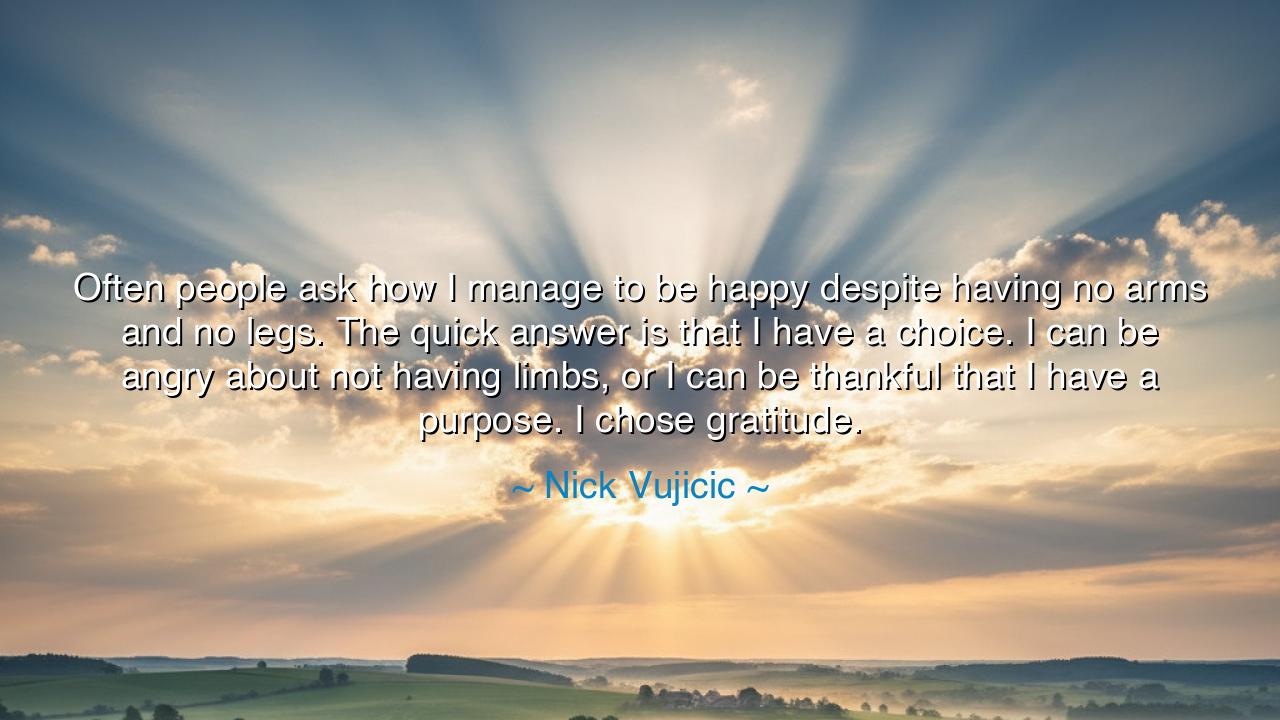
Often people ask how I manage to be happy despite having no arms
Often people ask how I manage to be happy despite having no arms and no legs. The quick answer is that I have a choice. I can be angry about not having limbs, or I can be thankful that I have a purpose. I chose gratitude.






Hear the words of Nick Vujicic: “Often people ask how I manage to be happy despite having no arms and no legs. The quick answer is that I have a choice. I can be angry about not having limbs, or I can be thankful that I have a purpose. I chose gratitude.” These words shine with the light of wisdom, born not from comfort, but from suffering transformed into strength. They speak of the eternal truth that while man may not control his circumstances, he always holds dominion over his spirit. Happiness is not the fruit of perfection, but the fruit of choice.
The origin of this reflection lies in Vujicic’s life, born without arms or legs. The world would call this a tragedy, a condition of despair. Yet rather than surrender to bitterness, he discovered the freedom of thankfulness. For what he lacked in limbs, he found in purpose. He chose to see his life not as a prison, but as a message of hope for countless others. His words are the echo of a warrior’s spirit: though the body may be broken, the soul can stand unshaken.
This truth has been sung throughout history. Consider the story of Epictetus, the Stoic philosopher born a slave, who lived with a crippled body. Though the world stripped him of freedom and health, he taught that no man can enslave the inner will. He declared that while fortune may wound the body, it cannot chain the mind unless we permit it. Nick Vujicic’s declaration is the same: adversity presents a choice, and by choosing gratitude, one transcends suffering and finds joy in purpose.
Notice how his words reveal the duality of life: “I can be angry, or I can be thankful.” Every soul is offered this crossroads. Anger, resentment, and despair are always within reach, whispering that life is unfair. But gratitude, purpose, and joy also stand waiting. To choose gratitude is not to deny hardship, but to rise above it. This is not weakness, but the highest form of courage. For anger is natural, but gratitude is divine.
In declaring, “I chose gratitude,” Vujicic teaches us that happiness is never an accident. It is cultivated, like a field planted against the weeds of despair. His life stands as proof that circumstances do not dictate joy—perspective does. And when one chooses thankfulness, even in the darkest hour, the soul shines with a brilliance that no misfortune can dim.
The lesson, then, is clear: every man and woman must recognize the power of choice. You cannot always choose your body, your wealth, your fate, or your trials. But you can choose your spirit, your outlook, your response. Gratitude does not erase suffering, but it transforms it, making even pain a teacher and even weakness a source of strength.
Practical actions flow from this teaching. When hardship comes, pause and remember that you hold the power to choose your response. Name your blessings, however small, and give thanks for them. Seek your purpose, even if your body or circumstances feel broken, for purpose is the anchor of the spirit. And when you find yourself tempted by anger or despair, recall Vujicic’s path: happiness is not found by accident, but by choosing gratitude again and again.
Thus, let Nick Vujicic’s words endure: though limbs may be absent, the will is free; though hardship may surround us, the soul can still choose gratitude. For in that choice lies not only happiness, but greatness—the kind that teaches future generations that no limitation can conquer the heart that refuses to surrender its joy.






AAdministratorAdministrator
Welcome, honored guests. Please leave a comment, we will respond soon